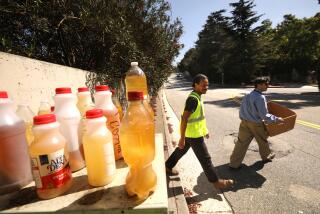Pepsi Takes Offensive Against Image Fizz : PR: The company is getting good marks for its handling of reports of tampering. Managers are meeting several times a day.
As numerous new reports of syringes and needles in Pepsi and Diet Pepsi cans surfaced Wednesday, soft drink giant Pepsico decided to go ahead this weekend and launch a massive TV ad campaign for Diet Pepsi featuring the popular singing trio the “Uh-Huh Girls.”
For the moment, at least, no advertising will respond specifically to the widely publicized reports--many of which federal investigators suspected were false--from consumers in more than a dozen states.
That doesn’t mean Pepsi has been passive in the face of what is potentially the most serious public relations crisis of its 74-year history. “Why buy advertising when we can go on ‘Nightline’ and make our case?” asked a Pepsi spokesman.
Top crisis management and public relations executives generally say that Pepsi has done a good job of handling the problem by taking the offensive and--among other things--placing its top domestic executive on virtually every major television news show.
Officials have explained the bottling process in plants. They have insisted that it is all but impossible for any of the syringes to have been inserted into cans during manufacturing.
“This is the kind of crisis that has the potential to bring a brand down,” said Robert Dilenschneider, a New York public relations consultant. But because of the quick actions Pepsi has taken, he said, “I don’t think it will bring down Pepsi.”
Pepsi, which does not contract with an outside public relations firm, has been handling the problem without the aid of consultants. “Why pay consultants $1,000 an hour to tell us what we already know?” posed Pepsi spokesman Andrew Giangola.
Instead, Pepsi has formed a corporate crisis management team of 12 senior executives who meet several times daily. The company has also added telephone operators to handle consumer and media calls, which number several thousand daily. And it has sent satellite tapes--featuring North American division President Craig Weatherup explaining what Pepsi is doing--to TV stations nationwide.
Pepsi executives insist that sales of Pepsi and Diet Pepsi have not yet been harmed by the reports of product tampering. Official sales figures for the month will not be available for several weeks.
“The most important thing is to constantly keep everyone up to date,” said Ron Rogers, president of the Los Angeles-based crisis management firm Rogers & Associates.
“It’s a logistic nightmare, but you have to do it,” he said.
If the crisis continues even a few days longer, PR specialist Dilenschneider said, Pepsi should take a poll of consumers and find out if it is affecting their buying habits. If it is, he said, Pepsi should run ads explaining what the company is doing about the crisis.
Few experts have said Pepsi should recall its colas from store shelves. But when the cause of the problem is found, Pepsi must fully explain it to consumers, said Dilenschneider. “The public needs to be fully satisfied that everything is all right,” he said.
Particularly since the negative publicity comes at perhaps the peak season for soft drink sales: summertime. In the intense competition with archrival Coca-Cola, Pepsi must vigorously defend its top-selling soft drink brands.
Pepsi’s retail sales exceeded $16 billion last year; sales of the Diet Pepsi brand hovered near $4.2 billion.
Pepsi is far from the first consumer company to deal with this sort of crisis. Perhaps the best-remembered product-tampering case occurred in 1982, when seven people died after taking cyanide-laced doses of Extra-Strength Tylenol.
Product-Tampering Cases
Some well-known product-contamination cases:
1982: Seven Chicago-area people died after taking cyanide-laced Extra-Strength Tylenol. No one was ever charged in the deaths. Tylenol’s manufacturer, McNeil Consumer Products Inc., a unit of Johnson & Johnson, settled with the victims’ families for an undisclosed amount.
1986: Rat poison was found in Contac, Teldrin and Dietac in Orlando, Fla., and Houston. No deaths resulted. A man who tried to manipulate the stock of the products was convicted.
1986: Glass fragments were reported found in Gerber baby food products in different parts of the country. The FDA said it was due to tampering or breakage during shipping.
1986: Two people were killed in Washington state after taking Extra-Strength Excedrin laced with cyanide. The wife of one of the victims was convicted.
1990: Perrier mineral water was pulled from shelves around the world after traces of the chemical benzene were found in some bottles shipped to the United States, Canada, West Germany and Denmark. Perrier officials said the benzene entered the water through a dirty pipe filter at the underground spring at Vergeze in southern France.
1991: Two people died in Washington state after taking cyanide-laced Sudafed capsules. A man was convicted for tampering with the capsules in an unsuccessful attempt to kill his wife.
* MAIN STORY: A1
More to Read
Inside the business of entertainment
The Wide Shot brings you news, analysis and insights on everything from streaming wars to production — and what it all means for the future.
You may occasionally receive promotional content from the Los Angeles Times.










